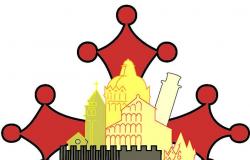For the 2024 Assembly Confartigianato Imprese Vicenza has chosen Europe as its theme and its key role in the development of national economies as a driver of growth alongside businesses in the face of global challenges.
“The European elections are an essential event for our future, as citizens, but above all as entrepreneurs, hence a reflection on how and how much Europe can do for craftsmanship and how much our businesses can do for Europe” , explains President Gianluca Cavion who opened the Assembly hosted at Fiera Vicenza by welcoming his colleagues and fellow members (over 700 in attendance), the institutional guests, and addressing “heartfelt thanks to the entire Board of Directors for the constant I commit”. Cavion also remembered the members of the Executive Council who daily monitor the issues that closely affect businesses: Cristian Veller who is the vice president and Roberta Cozza, Felice Baggio, Christian Malinverni, Riccardo Barbato and Ruggero Camerra.
“From the provincial headquarters to the territorial ones, we are available to 14 thousand member companies thanks to the skills and professionalism of 400 collaborators, led by the Director of the Association Francesco Tibaldo. We also thank them for what they do every day for our artisans”, added the president.
So here are the numbers of the artisans: beyond 23 million production units between artisans and micro, small and medium-sized enterprises which represent 99.8% of the total companies active in the countries of the Union, generate over 64% of jobs and 52% of added value. Italy and the Vicenza area are no exception as emerges from the data processed by the Confartigianato Research Office: 98.9% is the share of micro and small businesses which employ 61% of the total employees. And by the way, Vicenza is at the top of the national ranking in terms of manufacturing employment. Third for export volumes, while it ranks fifth for exports to the European Union which, with a total of 11.5 billion euros in 2023 alone, represents half of Vicenza’s exports to the world.
“Artisan businesses represent wealth for the territories in which they operate, for the country and for Europe, helping to create, with the payment of taxes, those funds which then benefit the community. We therefore have good reasons to make an appeal to the candidates of all political forces, so that the next legislature is truly an opportunity for a turning point, a change of gear. In fact, we know well how much and how European regulations increasingly impact every aspect of our lives and activities”, continued Cavion.
“Our country needs that smaller production companies are more important at the center of the strategic and economic agenda of the State and Europe”, added the president”.
“We want a Europe and an Italy ‘made to measure’ for small businesses. We need – reiterated the President of Confartigianato Imprese Marco Granelli – policies to support the productive fabric capable of valorising the 4 million Italian artisans, micro and small businesses which in our country express the excellence of the manufacturing tradition and the drive towards innovation and they have demonstrated their ability to create employment, economic well-being and social cohesion. These companies must be placed at the center of interventions to relaunch competitiveness, offering them simple and effective tools to face major market transformations, seize the opportunities of ecological and digital transitions, contribute to the construction of sustainable development”.
Confartigianato therefore expects a completely different regulatory approach from the future European Union, proportionate to the real size of Italian companies.
“A way of acting that starts from real contexts and needs must be further developed, no longer imposing measures and interventions from above that affect few – continued Cavion -. If we really want to keep craftsmanship alive, micro and small businesses must be valued and not ‘taken for granted’. Those who do business are by definition flexible, they compete on the markets, in short they do their job every day. A daily job that must not be confused with a ‘mute resignation’ but with the need to fill spaces left empty by often confusing and inefficient laws”.
The president recalled how “The resources that Europe makes available, combined with measures implemented by actors at local level, for example by the Region, or by the Chamber of Commerce, represent just as many opportunities for development. Often, however, the difficulty for small and medium-sized businesses is finding out about them, intercepting them and accessing them.”
The theme, even in this area, remains bureaucracy: 82.9% of companies, in fact, report the high complexity of the administrative procedures for accessing European tenders (15.1 points above the EU average). A simplification of procedures (51.2%), simple language in tenders and forms (33.9%), technical assistance for accessing tenders (19.9%) stand out among the companies’ requests.
From Confartigianato the appeal for a more inclusive and incisive effort in these processes, indispensable in particular for companies operating in production chains and value chains, for example automotive and fashion.
The president then focused on operational issues: “Unfair and inefficient selection procedures such as the click day should not be envisaged for tenders and financing. In Veneto this method has been overcome, thanks also to the actions forcefully advanced by Confartigianato. Still as a trade association, we are focusing on further ways to intensify the timely communication action aimed at members: both to promote the tenders and to explain which and how many are suitable for the different production realities. Another important point is reporting. We speed up the process of disbursement of resources as much as possible, asking for the minimum documentation necessary to prove the completion of the activities and the investment as a whole”.
A proposal therefore from Vicenza: within the allocations for public tenders, provide more resources dedicated to specific areas of craftsmanship or more tailored to small businesses.
“From the “new” Europe we expect the best tools and measures to be identified to finance innovation and investments by that myriad of companies that are small in terms of individual size, but not in terms of overall value, production and employment capacity , for social as well as economic importance. The task of Associations such as Confartigianato is to make the difference between those who know how to interpret the new from an overall project perspective, 15 years from now, which looks to the future and those who stop at the contingent”, concluded Cavion not without first mentioning as much as “the institutional dialogue with the Region and the Municipalities, for those like us who represent territorial representation, constitutes a fundamental driver for the development of balanced solutions. Just as the full involvement of the social partners in economic, labor and welfare policies at all levels cannot be missing.”
“Europe is, and always has been, an important opportunity for the country’s economic and entrepreneurial development. It is often argued that European tenders are “calibrated” for more structured businesses and therefore that artisan businesses are at a disadvantage in accessing them. Certainly a small artisan business can encounter difficulties in drawing up a project for a tender and reporting it adequately – commented Lucio Poma, chief economist of Nomisma -. But as we heard today during the Assembly, the artisan company is not alone and, supported by the Association, manages, as the examples shown, to take advantage of the advantages of the European tenders which allow it to make investments to expand the market or to innovate technologies. The Business-Association-Europe triad becomes a crucial lever for future development: of artisan businesses, of the economic fabric and of the regional economy as a whole”.
After President Cavion’s speech, the Assembly continued with a debate-interview, moderated by Gianmarco Mancassola, director of TVA Vicenza, first with Luca Zaia, president of the Veneto Region, then with Giacomo Possamai, Mayor of Vicenza. To close, a conversation moderated by Marino Smiderle, Director of Il Giornale di Vicenza, between Marco Granelli, national president of Confartigianato Imprese, and Adolfo Urso, Minister of Business and Made in Italy.





